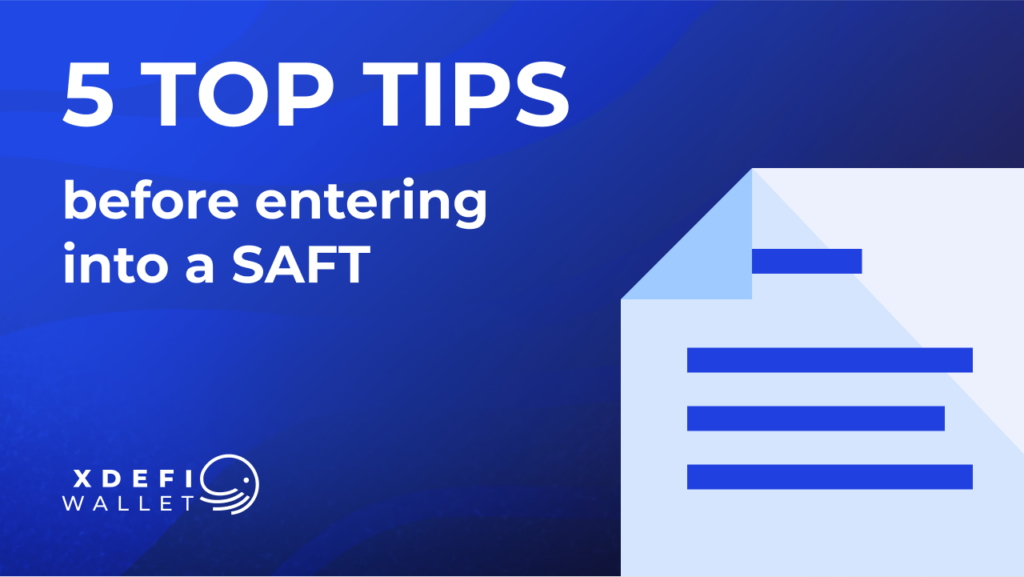5 Top tips before entering into a SAFT
August 2022
1. Governing Law & Jurisdiction:
- These clauses are often included towards the end of the SAFT and they are important as ideally you should obtain advice from a lawyer qualified in the applicable law & jurisdiction (assuming it is cost-effective to do so).
- Sellers tend to base the governing law and jurisdiction on either the country of the Seller’s incorporation/registration or a legal system or jurisdiction that may otherwise suit the Seller (for example one that is crypto or token friendly for regulatory or tax reasons).
- Some jurisdictions already have specific regulatory regimes in place for Virtual Asset Service Providers (VASPs) (e.g. Switzerland, Hong Kong & Singapore) and other jurisdictions appear to be taking a “wait and see” approach and no specific legislation or regulation has been enacted yet, though some is expected in the near future and so the position should be monitored (e.g. British Virgin Islands & Panama).
- If you ever need to sue or enforce your rights under the SAFT, then you will probably need to do so in the courts of that country/jurisdiction, which may even involve flying to that country and attending court hearings yourself in person.
2. Vesting Schedule:
- Typically, Sellers will want this to be quite long & buyers will want their tokens to vest asap.
- You may be able to negotiate a cliff into your vesting schedule so that, for example you wait 6 months for the first tranche of your tokens, but then you receive 6 months’ worth of tokens.
- Vesting schedules can, and do, vary but they are typically between 2 and 4 years.
- Ideally, they should not be > 4 years as this equates to a full market cycle.
- If the vesting schedule is < 2 years then, although this may at first seem great for the investor, this can create a lot of “sell pressure” on the token at launch, which can adversely impact the price.
- If your tokens are subject to monthly vesting over a 4 year period, for example then you may need to manually claim those tokens every month for 48 months, so again you need to check this and how to do so and maybe set reminders to do so each month.
3. Long Stop Date:
- While you may be prepared to wait a while when you enter into the SAFT, you may feel differently after a few months or even years of waiting.
- Check the SAFT for any long stop date so that if, for example, the token generation event (e.g. the ICO or IDO) has not happened by, for example 1 year or 2 years after the date of your SAFT, then you are entitled to demand a full refund of your $.
4. Representations & Warranties:
- Seller reps and warranties – the Seller may try to limit these and even if the Seller is at an early stage, it should still be able to provide some reps & warranties on items such as the Seller (i) being solvent, (ii) not being engaged in any material ongoing or threatened litigation or disputes, and (iii) complying with applicable AML laws.
- Buyer reps and warranties – these should be limited to the Buyer’s capacity to enter into the SAFT and AML related items.
- Ensure that these are balanced for both parties and ensure that you are comfortable with every single word of all the reps and warranties, as these could cost you $ in the future!
5. Indemnities and Liability Caps:
- As a buyer, you should really try to resist providing any material indemnities.
- If the SAFT contains any indemnities, then you should ensure that (i) these are relatively balanced (so if the Buyer is asked to provide some AML indemnities, then the Seller should also perhaps do so) and (ii) you are 100% comfortable with any indemnities you provide.
- As indemnities, reps and warranties can potentially result in considerable liabilities, then it is vital to ensure that there is an appropriate cap on your liability in the SAFT.
- This may be limited to the total amount you are providing under the SAFT or an appropriate % of it (e.g. 50%). Never agree to be liable for more than the total amount that you are providing!
Disclaimer: This article is for informational purposes only and does not constitute any legal, tax, investment, financial or any other advice. This article is no substitution for obtaining legal advice in the applicable law of your SAFT from a qualified and experienced professional. This list of 5 tips is not exhaustive and is just a high-level summary of certain items to consider and check. Entering into any SAFT is risky and your capital is at risk. Many crypto and token projects fail and cryptos and tokens are highly volatile and can fluctuate wildly in their price and valuations. Never invest more than you are prepared to lose. Carry out thorough due diligence and instruct your own legal and professional advisors before entering into any SAFT or similar agreement.



